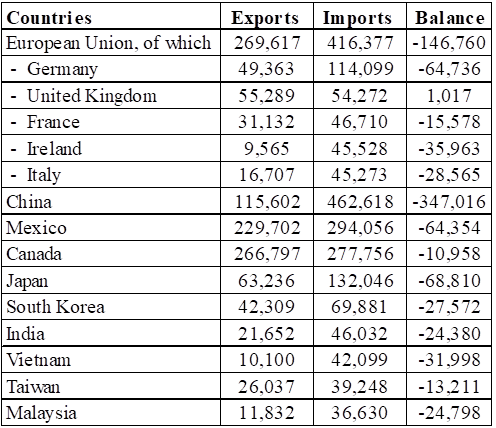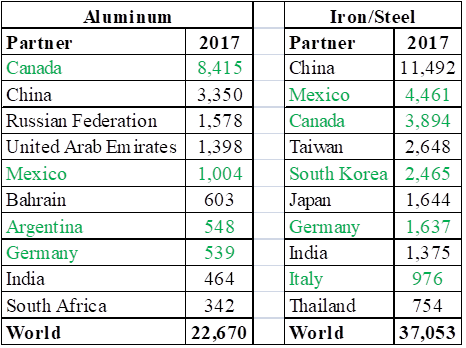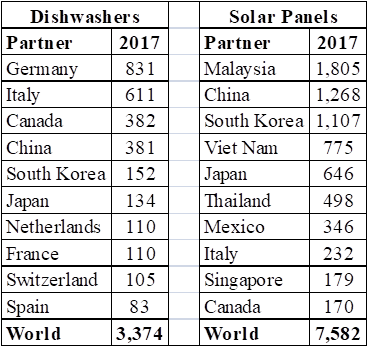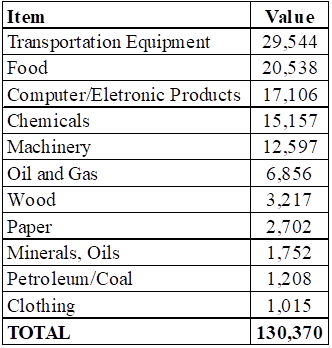Who is Kevin Hassett? Wolfe looks at the Trump ally tipped to become Fed Chair.
Introduction
One of Trump’s primary campaign themes was that other countries are taking advantage of the US. He said he would tear up trade agreements unfair to the US and impose tariffs on offending countries. And as President, he is following through on his promises. First he abandoned the Trans-Pacific Partnership. Next were tariffs imposed on dishwashers and solar panels. Then, tariffs on aluminum and steel of 10% and 25% respectively were announced. And Trump is now threatening to levy $50 billion in tariffs and penalties on China for the theft of trade secrets, etc. The following provides background on US trade, spells out the likely outcome of these actions and the fallacies underlying them.
Background on US Trade
Table 1 provides US trade data. The US imports more goods than it exports. In contrast, it has a significant positive balance on services. We hear that the US is reducing its dependency on oil. It is definitely down some, but it still runs a trade deficit of $111 billion with the rest of the world.
Table 1. – US International Goods and Services Trade Balances
(bil. US$)

Source: US Bureau of Economic Analysis
Table 2 lists the leading US trading partners. The European Union is the largest followed by China and the immediate US neighbors, Canada and Mexico.
Table 2. – US Leading Trade Partners, 2016
(bil. US$)

Source: US Bureau of Economic Analysis
Countries in the “Crosshairs”
Table 3 provides data on the largest providers of Aluminum and Iron/Steel. The countries in green are exempt, at least temporarily from the new US import tariffs. China will be hit hard.
Table 3. – Aluminum and Iron/Steel Imports
(bil. US$)

Source: Trade Stats Express
Dishwashers and Solar Panels
Table 4 lists the largest suppliers of dishwashers and solar panels to the US. Once again, China is a leading supplier.
Table 4. – Dishwasher and Solar Panel Imports
(bil. US$)

Source: Trade Stats Express
Retaliation
China has made it clear it will not “sit on its hands” and has threatened retaliatory steps. Table 5 indicates the leading US exports to China. And rest assured, the DC lobbyists for all of these exporters are hard at work in DC in hopes of “working things out” with China.
Table 5. – Leading US Exports to China
(bil. US$)

Source: Trade Stats Express
The General Agreement on Tariffs and Trade (GATT)/World Trade Organization (WTO)
Past trade wars, aiming to protect domestic industry via various trade barriers such as tariffs or quotas, have been extremely destructive for all parties involved. As a result, the WTO and its predecessor GATT were established as vehicles to avoid trade wars. Critical to the effectiveness of WTO is agreement by all members to abide by its arbitration process to settle disputes. As has happened with other treaties, there is concern that Trump will not abide by its processes.
The US played a major role in getting GATT/WTO established, and it has been active in using the WTO’s arbitration process. According to WTO data, the US has lodged 124 complaints for arbitration and other countries have complained about US trading practices 144 times. In contrast, there have only been 39 complaints registered against China, with 21 of them lodged by the US.
Trump Fallacies
a. Blaming China for Job Losses in Manufacturing
Trump regularly lambastes China for stealing US manufacturing jobs via unfair practices. In actual fact, my research and that of the McKinsey Global Institute have concluded that the vast majority of manufacturing jobs have been lost to automation and no “unfair labor practices.” And this finding applies globally to almost all goods and services industries.
b. Helping American Workers
By imposing tariffs on aluminum, steel, and solar panels, Trump wanted to help US produces of same. But in fact, there are more Americans working industries that use these products than there are in the aluminum, steel, and solar panel industries.
c. Trade Wars
Trump has been quoted as saying “trade wars are good and easy to win.” History is not on Trump’s side. Past trade wars have been devastating to all parties. And as noted above, the US has been a leader in getting both GATT and the WTO established. And the US has worked hard to use the WTO arbitration processes to protect its domestic industries. If Trump chooses to act unilaterally, he will find that trade wars are not good and there are no winners.
Conclusions
As the stock market sell-offs suggest, the world is entering dangerous and uncertain times. If Trump and his aides are not willing to submit their claims of unfair trade practices to WTO arbitration, there will be retaliatory actions. And nobody can foretell where this will lead.
